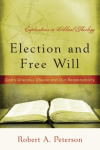CREATION AND CONSUMMATION (4)
 PMT-2016-021 by Kenneth L. Gentry, Jr.
PMT-2016-021 by Kenneth L. Gentry, Jr.
I am returning to my analysis of the Framework Hypothesis which overthrows the long-held traditional interpretation of Gen 1 by changing the clear message of the creation narrative in Genesis 1. As noted previously, this is significant for the postmillennialist in that the postmillennial argument literally begins “In the beginning.”
In the two previous articles I quickly presented and briefly rebutted the first two arguments for the Framework view: (1) The triad of days (i.e., the framework) in Genesis 1. (2) The new interpretation of Gen 2:5 which allegedly presents God’s modus operandi in creation week (i.e., slow providence rather than instant miracle). In this article we come to the final theological argument for the Framework Hypothesis that Meredith Kline and his disciples employ: the two-register cosmogony.
The two-register cosmogony explained
Meredith Kline not only created the new and innovative providence argument based on Gen 2:5, but later developed an all-new and rather complicated final argument for the Framework Hypothesis. Kline deems the two-register cosmogony to be the umbrella argument that covers the triad and providence arguments.
By this “two-register” idea Kline is speaking of the upper register (the realm of God’s special presence, heaven) and the lower register (the realm of man’s habitation, the cosmos). He argues that Genesis 1 speaks sometimes of the upper register and sometimes of the lower register,; and he argues that we must recognize where the shifts of thought occur.
Election and Free Will
by Robert A. Peterson
Election and Free Will helps Christians who believe in a Reformed view of predestination to better understand their faith. Robert A. Peterson traces Scripture’s teaching on election through the Bible and explains the doctrine of free will. He also tackles objections to predestination and concludes with applications of this neglected biblical teaching.
See more study materials at: www.KennethGentry.com
Particularly significant for the Six-day Creation view, Kline declares that the “days” of Genesis 1 belong to the upper register. They are a part of the analogical relationship between the upper and lower registers. The days are therefore not to be understood as literal, lower register time-frames, but as metaphors that use man’s work week to symbolically portray God’s work “week.”
Kline presents a few reasons for his creation (!) of this new approach (which makes his view a “new creation,” apparently!). Underscoring the supposition that Moses is speaking metaphorically are subtle evidences from the text. I will mention two of those.
First, the revelation of God’s creation of Adam employs anthropomorphism. It speaks of God’s work by employing the metaphor of a potter: “Then the LORD God formed man of dust from the ground, and breathed into his nostrils the breath of life; and man became a living being” (Gen 2:7). Clearly God did not literally use a potter’s wheel for creating Adam, this is an anthropomorphism (using things that belong to man [anthropos] and applying them to God).
Second, God “rests” on the seventh day: “God blessed the seventh day and sanctified it, because in it He rested from all His work which God had created and made” (Gen 2:3). This is another anthropomorphism which presents something that man would need to do, not God. It is applied metaphorically from man’s experience in the lower register to God in the upper register.
The two-register cosmogony critiqued
Two main problems undercut Kline’s argument that the days of creation are metaphors speaking of God’s upper register work: First, this idea contradicts the clear and express meaning of Exodus 20:11: “six days you shall labor and do all your work. . . for in six days the Lord made the heavens and the earth.” This informs us that man’s week is rooted in God’s original creation. Kline’s view has the matter exactly backwards of what God says.
Second, Kline uses anthropomorphisms in a new and unique way. Historically, anthropomorphism applies features of man’s being to God’s being, i.e., features of man’s body to God who does not have a body. We see this when Scripture speaks of the arm of the Lord, or the eyes of the Lord, and so forth.
And even beyond these major problems, we find that Kline really does not interpret these Genesis texts and images properly when he analyzes them. For instance, when God “formed” Adam’s body, Moses does not mention anything such as God using his “arms” and “back” in digging up the soil for this special project — though he can speak of God’s redemptive activity by using “arm” imagery elsewhere (Exo. 6:6; 15:16; Deut. 4:34; 5:15). Nor do we discover a reference to the Lord’s “hands” and “fingers” carefully sculpting Adam’s body, as in the metaphorical potter imagery found in the prophets (Isa. 45:9; 64:8; Jer. 18:4-6; Lam. 4:2). Genesis 2 presents a bold, supernatural event in unadorned, factual form: God formed Adam’s body from the ground — without detailing how he did it.
Thus, anthropomorphism is actually avoided in this revelation of the historical fact of God’s creative activity. Furthermore, over against any alleged anthropomorphic imagery in Genesis 2:7, we learn that Adam’s body was formed from the dry “dust from the ground” — not “clay” as employed in the familiar potter’s art in Israel (cf. Isa. 29:16; 41:25; 45:9; Jer. 18:4, 6). Even Genesis commentator Victor Hamilton observes of the verb Moses employs: “‘Potter,’ however, is a suitable translation only when the context clearly points to the fact that the work of formation being described is that of a potter.”
Bringing Heaven Down to Earth
(by Nathan Bierma)
A Reformed study of heaven. By taking a new look at the biblical picture of heaven,
Nathan Bierma shows readers how heaven can be a relevant, meaningful,
inspiring engine of Christian faith and kingdom service.
See more study materials at: www.KennethGentry.com
Also regarding the word “rest” found in Gen 2:2–3: neither is this an anthropomorphism. After all, the text of Gen 2:2-3 does not speak anthropomorphically of God “resting,” as if relaxing. It actually informs us that God “ceased” his labor. As Genesis commentator Kenneth Mathews observes: “The verb translated ‘rested’ here means ‘the cessation of creative activity’; it has this same sense in its only other occurrence in Genesis, where God promises the postdiluvian world that the times and seasons ‘will never cease’ (8:22).”
Elsewhere we find that God ‘rested’ (nûah, Exod 20:11; napaš, 31:17), but here in Gen 2 the passage speaks of the absence of work — ‘he abstained’ from work.” That is, God did not relax as if from weariness (as does man); he simply ceased from his creating work (creation week is over).
Actually the text is even stronger, for as Umberto Cassuto puts it: “this verb has been translated or interpreted by many as if it signified ‘to rest’ or ‘to cease work’; but this is incorrect. It has a negative connotation: ‘not to do work.’” And most certainly it is literally true that God ceased his creative working. Though it was not a laborious chore for him, it was most definitely “work” that effected something — the universe.
Thus, Kline’s new argument that Gen 2 involves anthropomorphism that allows us to read anthropomorphism into the creation days of Gen 1 fails. The majestic march of days in Gen 1 are clearly literal, successive, chronological days of creation week which serve as the basis for man’s work week.








Kenneth L. Gentry Jr.'s Blog
- Kenneth L. Gentry Jr.'s profile
- 85 followers



